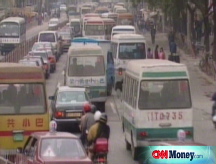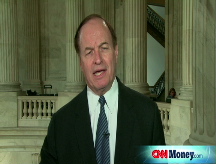More trouble for auto bailout
Auto chiefs find some support in Congress for a $25 billion loan package but a lot more criticism in a second day of hearings about a Big Three bailout.
NEW YORK (CNNMoney.com) -- Auto industry executives were back on Capitol Hill Wednesday to ask for a federal bailout but they once again faced an uphill battle in winning the necessary support from Congress for a $25 billion loan package.
Before the CEOs of General Motors (GM, Fortune 500), Ford Motor (F, Fortune 500) and Chrysler LLC even started their comments before the House Financial Services Committee, they faced criticism from the committee's ranking Republican, Spencer Bachus of Alabama.
"My constituents do not understand why their tax dollars should go to support what they consider less efficient businesses," said Bachus, adding that most of his constituents earn less money than the autoworkers whose jobs would be saved.
But House Financial Services Chairman Barney Frank, D-Mass., said it was wrong to focus on the pay of autoworkers when there was not much discussion of the pay of the average worker at financial firms that got government bailouts in October.
"I think the average AIG employee makes a good deal more than the auto workers," he said.
Frank criticized those who argued the automakers should file for bankruptcy in order to shed contracts with the unions and dealerships, saying that was "bankruptcy as a spectator sport." He said it would be unwise to ignore the damage that would be done to the overall economy if one or more automakers went bankrupt.
Bachus asked UAW President Ron Gettelfinger if the union would be willing to reopen the labor contract to grant more concessions. Gettelfinger said the union is always talking with the automakers but added that negotiations cannot be a one-way street.
"The UAW can't be the low hanging fruit. While we're at the table, we're asking that others come in and sacrifice as well," he said.
The $25 billion loan proposal is being considered by the so-called lame duck session of Congress. While Democrats made strong gains in both the House and Senate in this month's election, Republicans still control enough seats to allow them great power to block an bailout.
The industry is asking for cash to tie them over through the current downturn and is offering the government an equity stake in the companies if they get the help.
Democratic leadership, including Frank and Senate Majority Leader Harry Reid are proposing that automakers be given the money from the $700 billion set aside in October to help banks and Wall Street firms. The Bush administration has balked at that proposal.
White House Press Secretary Dana Perino said the administration is instead supporting legislation proposed Wednesday by Sens. George Voinovich, R-Ohio and Kit Bond, R-Missouri. That would free up $25 billion from the Energy Department already approved by Congress to help automakers cover the costs of converting to more fuel efficient vehicles.
GM CEO Rick Wagoner said at the hearing that this proposal would also work for the automakers since they weren't anticipating the money from the Energy Department in the near-term.
The bailout drew support from Republican and Democratic members of the Michigan congressional delegation, who also testified before the committee.
"I think what's missing is a sense of urgency," said Sander Levin, a Democrat from Michigan. "We're thinking of leaving here and taking the risk of bankruptcy? There's a looming risk."
General Motors announced Nov. 7 that it could run out of the cash needed for operations by the end of this year or early next year without federal assistance.
In testimony before the Senate Banking Committee Tuesday, Chrysler CEO Robert Nardelli said his company is also at risk of running out of the cash it needs to operate in that time frame.
But Paul Kanjorski, D-Pa., said he wasn't sure it was proper to be bailing out the automakers and he didn't like the demand that action be taken in this lame duck session of Congress.
"I am not yet convinced that we must act so rashly," he said. "The American public demands that we get this right."
Kanjorski asked Wagoner for the minimum amount of money necessary to keep GM afloat through March 30 in order to give Congress more time to work on a bailout package. "When will you run out of money?" he asked.
But Wagoner wouldn't give more details beyond the company's previous statement that it could be out of cash later this year or early next year.
"I don't believe we have the luxury of a lot of time," he said, and when pressed for an exact deadline, responded, "I can't tell you that for certain."
Numerous critics of the bailout have argued that the automakers should instead use bankruptcy protection to make the changes they need to be competitive rather than depend on federal assistance.
Wagoner, Nardelli and Ford CEO Alan Mulally said they had all looked at the possibility of a bankruptcy filing but that it was not a viable option.
Nardelli said even if Chrysler used bankruptcy to shed costs and contracts, it would find suppliers demanding cash on delivery of parts, which would cause an even greater cash crunch.
"It would turn us upside down, quicker and deeper than we are today," he said.
Wagoner said research showed car buyers are unwilling to buy from a bankrupt automaker and that because of the loss in sales, a bankruptcy filing would eventually lead to liquidation and closure.
But this did little to assure one representative who had asked about bankruptcy plans.
"That's a hell of thing to tell someone before you ask them for money," said Patrick McHenry, R-NC. "You're telling me inherently you're not creditworthy."
Rep. Randy Neugebauer, R-Texas, said that it was wrong for Congress to pick winners and losers in the economy.
"Where do we let the marketplace do what it does best, determine who to reward, who not to reward?" he asked.
Wagoner said the company had made many cuts in past years and earlier this year to try to avoid seeking federal help but added there was a huge risk for the economy if the bailout isn't approved.
"I can assure you...we don't like to be here asking for this," he said. "At this point without injections of liquidity, I think it's reasonably probable that some portion if not all of the domestic industry will not survive. The way I would explain it to your constituents is it's going to prevent the United States from entering into an economic depression in my view."
Several supporters of a bailout pointed out that China and some governments in Europe are considering bailing out their own automakers.
"It is unacceptable for America not to make its own cars," said Rep. Carolyn Maloney, D-N.Y. "No other country would let a major industry fail."
But other Democrats seemed to be unhappy with the idea of helping automakers as well.
Rep. Maxine Waters, D-CA, said she thought that the bailout legislation would pass but complained about automakers' arrogance and lack of support for minority-owned dealerships.
"What we basically get here are the big boys, well connected and too big to fail," she said. "In the final analysis, people are going to roll and you'll get what you're asking for."
Gary Ackerman, D-NY, talked about how he couldn't get a new Cadillac in the color he wanted and couldn't get anyone to answer questions about problems with his GPS system. But he pointed out that his wife has had great service with an imported car.
"Maybe you can tell us what you're actually going to do to sell cars people want," he said. "Somebody heard that we're giving out free money in Washington. They're showing up from all over the place. But you don't want to put your last tourniquet on a dead guy."
Ackerman and several other representatives suggested that it was difficult to give money to the automakers when the CEOs had all flown to Washington on corporate jets.
"Those types of symbolic things matter and set a tone," said Peter Roskam, R-Ill.
The hearing concluded with Rep. Michael Capuano, D-Mass., telling the automakers that he wanted to help them but that they were extremely unpopular.
"My constituents basically do not trust you," he said. "I need some assurances, my constituents need some assurances, that you're not going to blow this again. My fear is you're going to take this money and continue the same stupid decisions you've made for 25 years." ![]()



